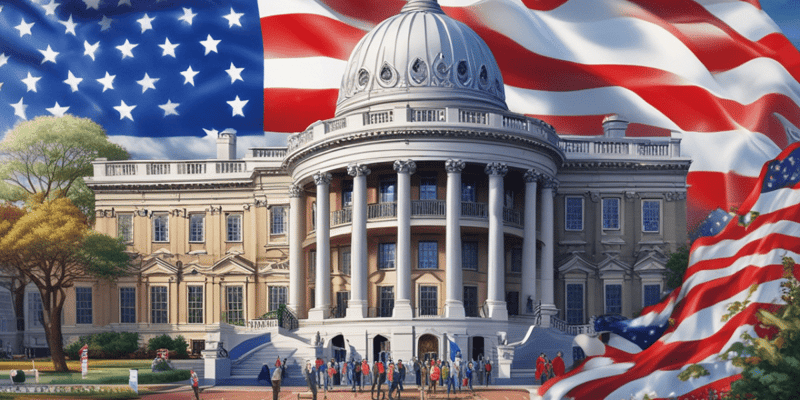38 Questions
If a vacancy occurs in the office of the President, when should an election be held?
Within 6 months from the date of occurrence of the vacancy
What happens to the President if they are removed from office?
They are removed from office immediately
What is one of the Executive Powers of the President?
Heading the Union Administration
What is a privilege of the President during their tenure?
They cannot be asked to be present in any court of law
What happens if a two-thirds majority passes a resolution?
The President is removed from office
Who are subordinate to the President?
All Union officials
In what scenario would an election be held?
All of the above
What is the term used to describe the President's protection from being sued during their tenure?
Presidential immunity
How much prior notice is required before instituting a civil case against the President?
Two months
Who does the President appoint as the head of the government?
The Prime Minister and the Council of Ministers
What is the process called by which the President can be removed from office?
Impeachment
In which house of Parliament can a resolution to impeach the President be moved?
Either house of Parliament
What is the President not accountable for?
The exercise of his functions
Who advises the President in appointing the Prime Minister and the Council of Ministers?
The Leader of the majority group in Parliament
What is the purpose of the prior notice before instituting a civil case against the President?
To allow the President to prepare a defense
Who is immune to arrest and criminal proceedings during their tenure?
The President
What is the primary role of the Cabinet in the government?
To formulate foreign policy and domestic policy agendas
What is the relationship between the Council of Ministers and the Cabinet?
The Cabinet is a subset of the Council of Ministers
What is the role of the Prime Minister in the Cabinet?
The Prime Minister is the head of the Cabinet
What type of government does India have?
A democratic republic with two types of government
What is the role of the President in the government?
The President is the head of State and the first Commander of the Indian Armed Forces
What is the composition of the Union Executive?
The President, the Prime Minister, and the Council of Ministers
What are the three organs of the Union Government?
The Executive, the Legislature, and the Judiciary
Who appoints the Ambassadors, High Commissioners, and other diplomatic representatives?
The President
Who appoints the Prime Minister?
The President
What is the main function of the Executive?
To implement laws
What is a budget?
An estimate of income and expenditure for a set period of time
Who is the second highest ranking government official in India?
The Vice-President of India
Who is the head of the Council of Ministers?
The Prime Minister
What is the relationship between the President and the Prime Minister?
The Prime Minister is subordinate to the President
Who recommends persons to be appointed as ministers by the President?
The Prime Minister
What power does the Prime Minister have in relation to the Lok Sabha?
He can recommend dissolution of the Lok Sabha to the President
What is the main characteristic of the Executive in the Republic of India?
An executive authority, led by the Prime Minister
What is the role of the Prime Minister in the Council of Ministers?
He is the leader of the Council of Ministers
What is the power of the Prime Minister in relation to the President?
He can advise the President on any matter
What happens if the Prime Minister and a minister have a difference of opinion?
The Prime Minister can ask the minister to resign
What is the role of the Prime Minister in relation to government policies?
He announces government policies on the floor of the House
Who presides over the meetings of the Council of Ministers?
The Prime Minister
Study Notes
The President of India
- The President is the head of State and the first citizen of India.
- The President can only be removed from office through a process called impeachment.
- The President has the power to issue executive orders.
- The President is the head of the Union Administration.
- The President makes appointments to key posts, including:
- The Prime Minister and the Council of Ministers
- The Attorney General of India
- The Comptroller and Auditor General of India
- The Chairman and members of the Union Public Service Commission
- The Chairman and members of the Planning Commission
- The Governors of the States
- The Chief Justice, and the Judges of the Supreme Court and the High Courts
Privileges and Immunities of the President
- The President cannot be asked to be present in any court of law during their tenure.
- A prior notice of two months' time is to be served before instituting a civil case against the President.
- The President cannot be arrested or criminally prosecuted during their tenure.
- The President is not answerable to any court of law for the exercise of their functions.
The Vice-President of India
- The Vice-President is the second-highest ranking government official in the country.
- The Vice-President can choose the leader of any party to form a stable government.
The Prime Minister of India
- The Prime Minister is the leader of the House and enjoys the following powers:
- Recommending persons to be appointed as ministers by the President
- Advising the President with regard to summoning and proroguing of the sessions of the Parliament
- Recommending dissolution of the Lok Sabha to the President at any time
- Announcing government policies on the floor of the House
- Influencing the decisions of the Cabinet
The Council of Ministers
- The Council of Ministers has executive, legislative, and financial powers.
- The Cabinet formulates foreign policy and domestic policy.
- The Cabinet is responsible for expenditure and can recommend the President to take action in case of national emergency.
- The Cabinet has the power to appoint:
- Consuls
- Ambassadors
- Envoys
- Governors
- Members of UPSC
- Military Commanders
- High Commissioners
- Judges of the High Courts and the Supreme Court
This quiz is about the process of electing a President in the United States, including the timing of elections and the requirements for membership.
Make Your Own Quizzes and Flashcards
Convert your notes into interactive study material.
Get started for free




